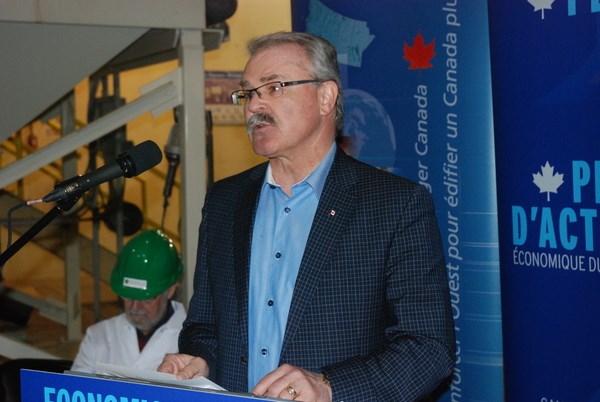There was willingness to meet, but no firm commitments from Battlefords-Lloydminster MP Gerry Ritz about federal help towards public safety in North Battleford this past week.
City council passed a resolution to meet with provincial and federal ministers in a joint meeting to discuss an action plan on public safety. They requested a meeting with federal Public Safety minister Steven Blaney on the issue and there had been some back and forth correspondence on the issue.
Ritz expressed his willingness to meet with North Battleford's city officials on their public safety concerns. "I'm happy to discuss that with the mayor and council in the Battlefords should they decide to have a meeting," said Ritz Wednesday.
But in speaking to reporters while at a party fundraiser in Lloydminster that night, Ritz noted most responsibility for policing is ultimately at the municipal and provincial level. Federal responsibility mainly dealt with other areas, including the training of police.
"We make sure that the police are trained, that they're hired by the province and the municipality of record, whether it's the RCMP or their own police force," said Ritz. "We put laws in place in the Criminal Code to make sure that those that do the crime do the time that's warranted. So we'll continue to do that."
It is "more the province and municipality level that does the actual policing, keeping the community safe," said Ritz. "We pass the laws that they put into play."
It was those latter efforts by the federal government to toughen Criminal Code provisions that drew an enthusiastic response from those attending the Conservative fundraiser at Stockade Convention Centre that evening in Lloydminster.
Federal Employment and Immigration Minister Jason Kenney spoke about those efforts in his speech.
"We've said there will be serious consequences for serious crime," Kenney told the audience, who then broke into applause when he went on to say "serious criminals - repeat criminals - will no longer be allowed to do 'house arrest' or 'conditional arrest.' They will be spending their time behind bars."
Kenney also described efforts by fellow Conservative MP Joy Smith to put forward and pass a private members bill to stop the human trafficking of minors.
Kenney noted the five-year minimum sentence set out in that bill and went on to criticize the opposition, and particularly Liberal leader Justin Trudeau, for opposing it and calling it too harsh.
"Apparently he thinks it's too tough on people who exploit children to spend five years behind bars if convicted," Kenney said. "That's why we cannot let Justin Trudeau become prime minister of Canada."




